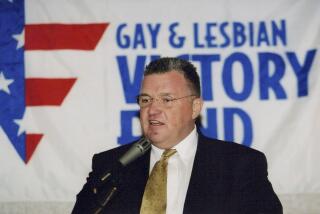Honored Jewish Activist Nathan Perlmutter Dies
- Share via
Nathan Perlmutter, a lawyer, lecturer and leader of the American Jewish community for 40 years, died Sunday in Manhattan of lung cancer. He was 64.
An author and political activist, Perlmutter was national director of the Anti-Defamation League of B’nai B’rith. Last month, he was given the Presidential Medal of Freedom, the nation’s highest civilian award. In presenting the award, President Reagan lauded Perlmutter as “a hero of the human spirit.”
An outspoken critic of intolerance against any group, Perlmutter joined the Anti-Defamation League in 1949. The league, founded in 1913, strives to “end defamation of Jews and secure justice and fair treatment for all citizens alike.”
Active in Politics
Perlmutter was often at the forefront of politics, defending Jewish interests on issues ranging from the Middle East to Democratic politics and shaping the national agenda.
In 1981, when a coalition led by Israel and American Jewish groups opposed Reagan Administration plans to sell AWACS surveillance aircraft to Saudi Arabia, Perlmutter defended the lobbying effort against congressmen who complained of “strong-arm” tactics.
“If the answer is for the American Jewish community to surrender its privilege and its right to participate in democratic debate, it would seem to me too high a price to pay for curbing latent anti-Semitism,” he said.
Although a fervent supporter of Jewish interests in the Middle East, Perlmutter also criticized Israel. After the Jonathan Jay Pollard spy affair, in which Pollard, a civilian intelligence analyst for the U.S. Navy, was implicated as an Israeli spy, Perlmutter was quick to attack Israel’s role. “What began in stupidity quickly sank into irresponsibility,” he said. “If this was a rogue operation, it’s a fair question to ask why Israel has proceeded to promote the rogues.”
Besides the Medal of Freedom, Perlmutter received other accolades for his civil rights work, including the Eleanor Roosevelt Human Rights Award. The President again lauded Perlmutter in January when he received the B’nai B’rith International Presidential Gold Medallion.
“You have done much to strengthen the American tradition of individual rights,” Reagan said in a letter read at the ceremony, “reminding us always that the fate of Jews is inextricably linked to the fate of democracy.
“To read your articles and books is to experience the workings of a free mind re-examining old ideas in order to better understand the present and to work for a better future.”
Perlmutter wrote for various journals, including Commentary, New Leader and The Nation. He wrote two books, “A Bias of Reflections,” and “The Real Anti-Semitism in America,” co-written with his wife, Ruthann.
The son of a Polish immigrant, Perlmutter grew up in Brooklyn’s Williamsburg section. His father was a tailor, who worked in the Works Project Administration during the Depression, while his mother sold ices from a pushcart.
“We were poor, but not underprivileged,” he wrote later.
Perlmutter worked at the Pentagon as a clerk and attended Georgetown University School of Diplomatic and Consular Practice. He also studied at Villanova College and graduated from the New York University School of Law.
Perlmutter is survived by his wife; a brother, Philip; a son, Dean, 36; a daughter, Nina Mohit, 39, and a grandchild.
Ruthann, his wife of 44 years, said the disease did not detract from her husband’s passion for life.
“The brain and the tongue and the intellect were all in full flower,” she said. “It was debilitating physically, but not mentally.”
The couple shared a love of horses, and their horse, Ruthie’s Native, won the Florida Derby in 1977. Bolstered by the championship, they co-wrote a second book, “How to Win Money at the Races.”
In an November, 1985, article in the New York Times, “Diary of a Cancer Patient,” Perlmutter described his feelings about his illness.
“Funny how your uniqueness fades when you realize your reactions are all a graph that can be predicted,” Perlmutter, a cigar and pipe smoker, wrote. “I seem resigned to it--with the feeling that I sure as hell don’t want to hang on, medicated to senselessness, just to stay ‘alive.’
“So it’s not a feeling of ‘why me?’ or ‘I’m too young to die.’ But I am sad. I’d have to be a dummy to be glad.”
More to Read
Sign up for Essential California
The most important California stories and recommendations in your inbox every morning.
You may occasionally receive promotional content from the Los Angeles Times.










